|
|
|
Sort Order |
|
|
|
Items / Page
|
|
|
|
|
|
|
| Srl | Item |
| 1 |
ID:
117045
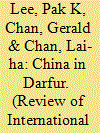

|
|
|
|
|
| Publication |
2012.
|
| Summary/Abstract |
Most people hold that in its quest for natural resources abroad, China shields rogue states with egregious human-rights record from international opprobrium and sanctions. Its political support for Sudan is a case in point. By examining Chinese perspectives on humanitarian intervention and national sovereignty, this article first argues that Beijing's interests are so multiple and complex that concern about the implications of humanitarian intervention for national integration is more crucial than oil in determining its policy towards Sudan. Paradoxically it asserts that China, a non-democratic country, is more influential than liberal democratic states in making the rules of humanitarian intervention in Darfur because of a lack of political will in the West. In addition, there are early signs that China intends to utilise its newfound power to remake international rules regarding territorial sovereignty. Further development is likely to be shaped by its interactions with the United States.
|
|
|
|
|
|
|
|
|
|
|
|
|
|
|
|
| 2 |
ID:
130707
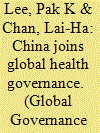

|
|
|
|
|
| Publication |
2014.
|
| Summary/Abstract |
In the wake of China's rapid ascendancy, are there any new rules made by the country in global health governance? This article examines China's emerging role in the Agreement on Trade Related Aspects of Intellectual Property Rights and finds that China adopts a pro-status quo stance on patented medicines. Aspiring to develop its own pharmaceutical sector to be capable to produce patented medicines on a par with the West, it has little appetite for using the prevailing rules or making new rules that are to the liking of the developing world. Undoubtedly, China is a new player in global health governance but has yet to have agenda-setting intent and capacity. This article argues that China's behavior and preferences can be explained by its dualistic national identities, the dominant position of realism in both the study of international relations and policy circles, and an underdevelopment of epistemic community in global health governance in the country.
|
|
|
|
|
|
|
|
|
|
|
|
|
|
|
|
| 3 |
ID:
143923
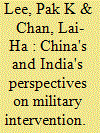

|
|
|
|
|
| Summary/Abstract |
This article addresses the puzzle for students of international relations as to why China and India, two major re-emerging powers in Asia, do not always baulk at military intervention invoked by Chapter VII of the United Nations Charter, while they rhetorically harbour strong reservations about it. The recent cases of Côte d'Ivoire (2011), Libya (2011), Syria (since 2011) and Mali (since 2012) show that both China and India acquiesced in external military intervention in these African countries plunged into brutal civil wars, with only intervention in Syria being rebuffed. By studying how they voted in the United Nations Security Council in 2011–12 and their discourses on intervention, including humanitarian intervention, this article examines why their decisions about intervention in Africa diverged from their decisions regarding intervention in Syria. The authors put forward the thesis that their behaviour can be explained by an interplay between norms and interests, in which they express a common anti-US liberal imperialist stance, shaped by a ‘collective historical trauma' and ‘post-imperial ideology', and demonstrate concerns for state failure and preferences for regional initiatives and political mediation to resolve civil wars.
|
|
|
|
|
|
|
|
|
|
|
|
|
|
|
|
| 4 |
ID:
081230


|
|
|
|
|
| Publication |
2008.
|
| Summary/Abstract |
This paper examines the connection between China's domestic governance and its involvement in global governance in environmental protection by studying the major actors and issues involved in the interaction between the domestic and international spheres of activities. These actors include international institutions, national and local governments, nongovernmental organisations, and others. The paper demonstrates that China has made some substantive progress in protecting its environment, but much more needs to be done. Internationally it seems to lack the will or the capability to make much contribution towards global environmental governance. However, because of its huge aggregate size, what it does or does not do to avert environmental degradation at home could have a significant impact on collective efforts to protect the environment at the global level.
|
|
|
|
|
|
|
|
|
|
|
|
|
|
|
|
| 5 |
ID:
064688


|
|
|
| 6 |
ID:
124666
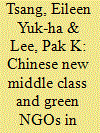

|
|
|
|
|
| Publication |
2013.
|
| Summary/Abstract |
By examining the emerging Chinese new middle class as well as green non-governmental organisations (NGOs), this study finds that while the emergence of the Chinese new middle class facilitates the growth of green NGOs, the Chinese new class are not activists or agitators working against the government. Based on in-depth interviews with leaders of green NGOs in Guangdong Province, this research examines why green NGOs founded by the Chinese new middle class do not call for or advocate environmental protection. It concludes that contrary to conventional wisdom, the Chinese new middle class is a vanguard of guanxi (connections)-seeking, but a laggard in promoting environmental protection and civil-society activism. Green NGOs are principally used as a tool to cultivate social capital in the form of guanxi in order to promote personal material interests.
|
|
|
|
|
|
|
|
|
|
|
|
|
|
|
|
| 7 |
ID:
174070
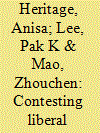

|
|
|
|
|
| Summary/Abstract |
As the introduction to the special issue on 'Contesting liberal internationalism: China's renegotiation of world order', this paper outlines the theoretical framework of the special issue, namely international order and order contestation, and the main arguments of the four papers included in this special issue. Recently, a, albeit not the, key challenge to the liberal international order stems from the leadership aspirations of non-Western, non-liberal states, and their increasing demand for a greater voice, most notably China under the leadership of Xi Jinping. This special issue is constructed as a debate concerning the alleged challenges posed by China to both the political and economic spheres of the liberal international order. The four case studies and papers are grouped into two core themes: the impact of China's state-capitalist development model and practices on the liberal economic order, and China's attempts to transform norms and rules in security-related matters. The four papers aim to appraise Chinese discursive narratives and practices that would collectively challenge American liberal hegemony. Altogether they argue that a hybrid of order-building norms and practices is likely to co-exist alongside the prevailing liberal international order.
|
|
|
|
|
|
|
|
|
|
|
|
|
|
|
|
| 8 |
ID:
174554


|
|
|
|
|
| Summary/Abstract |
This article addresses an important empirical puzzle: why has the United States, without exception, chosen not to intervene in the six humanitarian catastrophes in post-war Asia, namely in Indonesia, East Pakistan/Bangladesh, Cambodia, East Timor, Sri Lanka and Myanmar? We use an eclectic approach that blends arguments about the international normative structure and geostrategic interests to examine what has made the absence of humanitarian intervention in Asia by the US possible and legitimate. Specifically, we focus on the paradox between calls for humanitarian intervention and the historically and geographically contingent social construction of the norms of humanity, national sovereignty and United Nations-backed multilateralism in conjunction with US and Chinese concerns over their regional geostrategic interests. The normative narratives about race, ‘communists’, ‘terrorists’, international order and inclusive multilateral processes, and the geostrategic interests of the US and China, combine to make non-intervention possible and legitimate.
|
|
|
|
|
|
|
|
|
|
|
|
|
|
|
|
| 9 |
ID:
174074


|
|
|
|
|
| Summary/Abstract |
Conventional accounts of the South China Sea territorial disputes identify China’s assertive behaviour as the primary cause of the rising tension since the early 2010s. This paper goes beyond this traditional interpretation of the disputes by arguing that the territorial disputes are an expression of the broader contestation between two order-building projects by China and the United States (US). China’s assertive behaviour originates in its desire to promote a ‘historical’ and ‘post-colonial’ maritime order that is premised on its Sino-centric historical narrative of the Sea and on its emphasis on the historical legitimacy of the regional order of 1943–1945. The US-led ‘liberal’ maritime order is underpinned by a post-war legal framework built on the San Francisco Peace Treaty and the United Nations Convention on the Law of the Sea, and the notion and practice of freedom of navigation. Since October 2015 the US has enhanced its freedom of navigation operations to challenge China’s ‘excessive’ maritime or territorial claims. We conclude that as a result of the uneasy coexistence of these two order-building projects, which fundamentally disagree over the foundations of maritime order in the South China Sea, the disputes have reached an open-ended impasse.
|
|
|
|
|
|
|
|
|
|
|
|
|
|
|
|
|
|
|
|
|